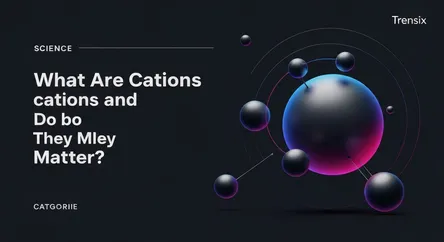Science
What Are Cations and Why Do They Matter?

Explore cations, the positively charged ions essential to everything from the batteries in your phone to vital functions within the human body.
What is it?
A cation is an atom or molecule that has a positive electrical charge. In the neutral state, an atom has an equal number of protons (positive particles) and electrons (negative particles). A cation is formed when a neutral atom loses one or more electrons. With fewer electrons than protons, the atom develops a net positive charge. This process is common among metallic elements, such as sodium (Na+), calcium (Ca2+), and iron (Fe2+ or Fe3+). Cations readily bond with negatively charged ions, called anions, to form ionic compounds like table salt (sodium chloride).
Why is it trending?
Cations are fundamental to advancements in green technology and materials science. Research is heavily focused on using specific cations to create more efficient and safer batteries. For instance, lithium cations (Li+) are the backbone of most rechargeable batteries that power our portable electronics and electric vehicles. Scientists are exploring other cations like zinc and magnesium as potentially cheaper and more abundant alternatives. Furthermore, cations are critical in developing new materials for water purification and in industrial processes like creating fertilizers that improve soil fertility and crop yields.
How does it affect people?
Cations are essential for life and are part of our daily experience. In the human body, cations like sodium (Na+), potassium (K+), and calcium (Ca2+) are known as electrolytes. They play a crucial role in conducting nerve impulses, enabling muscle contraction, and maintaining the body's water balance. We consume these vital cations through our food and drinks; for example, table salt is made of sodium cations and chloride anions. They are also the key components that make sports drinks effective for hydration. Cations are also integral to technologies we use daily, such as batteries and water softeners that remove hard water-causing cations like Ca2+ and Mg2+.